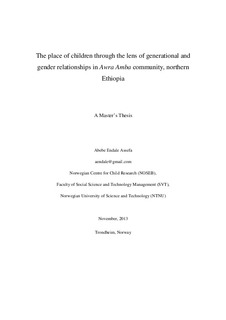| dc.contributor.advisor | Abebe, Tatek | nb_NO |
| dc.contributor.author | Assefa, Abebe Endale | nb_NO |
| dc.date.accessioned | 2014-12-19T14:37:40Z | |
| dc.date.available | 2014-12-19T14:37:40Z | |
| dc.date.created | 2014-01-06 | nb_NO |
| dc.date.issued | 2013 | nb_NO |
| dc.identifier | 683679 | nb_NO |
| dc.identifier.uri | http://hdl.handle.net/11250/269116 | |
| dc.description.abstract | This study explores the place of children through the lenses of generational and gender relationships in Awra Amba community, Northern Ethiopia. It discusses what children’s life from gender and generational perspective look like in Awra Amba community. The study is based on the following research questions. What are the social values and roles of children in the community? What does gender relationship among children and between children and adults look like in Awra Amba community? What is “special” about children of Awra Amba Community? To document the place of children through answering these questions, the study employs qualitative research methods such as in-depth interview, focus group discussion observation, informal dialogue and home visit. These qualitative methods were used as the issue to be explored needed a complex and detailed understanding. In other words, the research project was qualitative in its nature because the researcher needed an intricate and thorough understanding of the issue. Children whose age ranges from12-15 years and their parents (both mothers and fathers) whose age ranges from 32-40 and 48-72 respectively including the founder and the leader of the community, Zumra Nuru, were included in the study as participants (research subjects). The study is informed by social constructivism through viewing children’s place and childhood among the Awura Amba community from discursive construction, structural construction, generational construction and children as social actors perspectives. The study observes children’s place among the community from three angles: gender equality, social order and intergenerational relationships. It argues that children are active participants in activation and perpetuation of gender equity, social order and egalitarian intergenerational relationships. Such perspectives of children indicate that children are well aware of the collective values among the community and are exercising them as part of their everyday lives. | nb_NO |
| dc.language | eng | nb_NO |
| dc.publisher | Norges teknisk-naturvitenskapelige universitet, Fakultet for samfunnsvitenskap og teknologiledelse, Norsk senter for barneforskning | nb_NO |
| dc.title | The place of children through the lens of generational and gender relationships in Awra Amba community, northern Ethiopia | nb_NO |
| dc.type | Master thesis | nb_NO |
| dc.contributor.department | Norges teknisk-naturvitenskapelige universitet, Fakultet for samfunnsvitenskap og teknologiledelse, Norsk senter for barneforskning | nb_NO |
